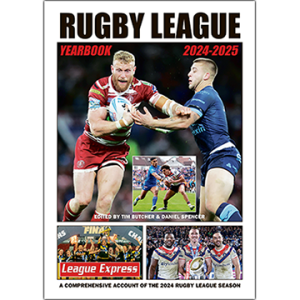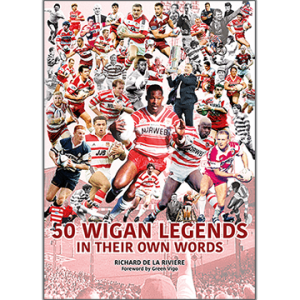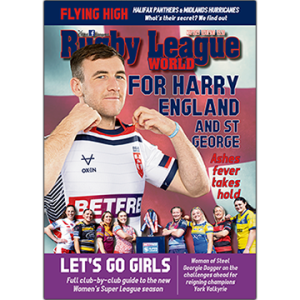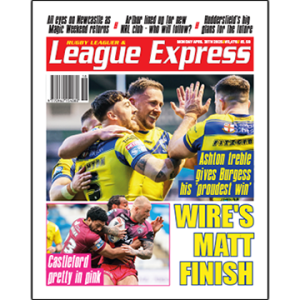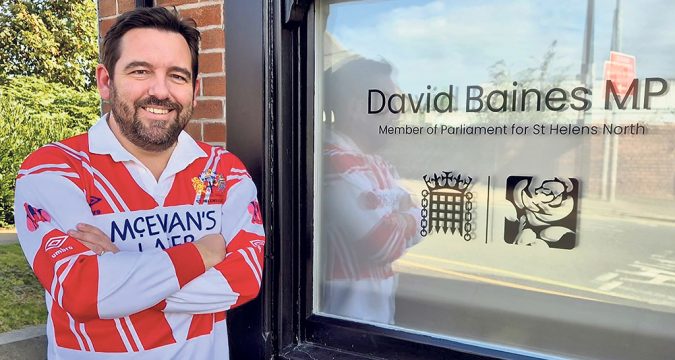
David Baines combines his love of rugby league with his role as a Member of Parliament to speak up for the game in the corridors of power.
WITH fulsome apologies to the editor, the last time I caught up with the chair of the All-Party Parliamentary Rugby League Group (APPRLG) it was for a rival publication.
Leading the group more than a decade ago was David Hinchliffe, then Labour MP for Wakefield. Hinchliffe founded the APPRLG and was instrumental in lifting the ban on rugby league in the armed forces as well as challenging the Rugby Football Union’s lifetime ban on any adult who had played league.
Despite these key victories it’s fair to say that when Hinchliffe left office the problems facing rugby league were pretty much the same ones it struggles with today. A lack of national and media recognition, concerns over shrinking player numbers – especially at junior level – dwindling funding and an inability to break out of its geographical confines, certainly at professional level.
However, a new parliament has brought a new APPRLG chair. David Baines, the recently elected Labour MP for St Helens North, has stepped into the shoes of Judith Cummins, MP for Bradford South, now a deputy speaker of the House of Commons. And he’s aware of the scale of the task ahead.
“Judith did a great job,” he says. “But her new position meant she had to resign. As a lifelong fan I thought I should throw my hat into the ring. What’s interested me since I took over is how many people in parliament know of rugby league. It is more respected than I expected, yet it’s quite misunderstood: its history, background and its place in British sporting and social life.”
Baines says one aim is to raise the game’s profile both in Parliament and beyond. “It’s under-represented in government and society generally,” he believes. “And it’s part of a class and cultural divide, part of the north-south divide, perhaps.”
Could the same charge of under-representation be levelled at our national media organisations? “There’s a general, maybe inadvertent, prejudice that thinks rugby league isn’t important and therefore not worth talking about, and I don’t doubt that we are guilty of inverse snobbery too,” he replies. “But with the media predominantly based in London it reduces the coverage we get. That’s true of many things distant from London not just rugby league, but the truth is people who see the game learn to respect it wherever they live.”
We are sitting in the lobby of Portcullis House, opposite the Houses of Parliament and where many MPs have offices. And it was in the Commons recently, following the release of the New Years’ Honours List, that Baines raised the issue of rugby league missing out on such awards. Not a single person has been knighted for services to the game.
Baines was backed by speaker of the House, Lindsay Hoyle, another staunch League advocate. “It can only boil down to prejudice and class,” Baines says. “You see it with other possibly working-class sports such as boxing and snooker.” Snooker too has never had a knight and boxing only one, Henry Cooper. Even sheep-shearing has one more than rugby league. Meanwhile, there are 19 rugby union knights.
So who might he consider for a knighthood? “Kevin Sinfield is an obvious candidate,” he says. “But from the past Billy Boston, a cross-coder who suffered class and racial prejudice but rose through it. And, as a Saints fan, there’s Alex Murphy, a great player who helped popularise the game in the 1980s. Then there are the volunteers who prop up our community game for free. They make such a difference to kids’ and families’ lives – the bedrock of our sport.”
If Baines is as passionate about his politics – and there’s no reason to assume he wouldn’t be – then Prime Minister’s Questions should be enlivened. We spent the first 10 minutes reliving matches from our respective youths, before being joined by his senior parliamentary assistant who added to the mix. The fact that he is Anthony Broxton, author of Hope & Glory: Rugby League in Thatcher’s Britain and more significantly a devout fan of Saints’ biggest rivals Wigan, shows Baines is prepared to put the sport ahead of his club. “The game is paramount,” he says. “I couldn’t have taken this role unless I recognised that.” He laughs. “That said I still haven’t watched back the 1989 Challenge Cup Final and probably never will. I went to school in Wigan. Believe me, I suffered.” Readers may recall Wigan beat Saints 27-0.
“I’m proud of our game,” he adds. “Nobody else has anything like it. It was born of political struggle. But it’s not just its heritage, important though that is. It’s also the most exhilarating team sport anywhere. I want others to appreciate that.
“I was seven and my first Wembley final was Saints against Halifax in 1987,” he recalls. “I had a choice of going with my parents or staying with my gran. I chose the former so in the end we all went. I remember the excitement, the singing, the colours. My memories of rugby league are so family-based, spending time with my mum, dad and granddad watching Saints and Great Britain. As a kid my dad took me down to Blackbrook, then Haydock. I stopped playing in my teens, although…” he smiles, “I’ve never given up hope of playing for Saints [he is 45].
“Having played as an amateur I realise how important the community game is. No other sport which has an elite level also has that attachment to its communities. Rugby league was a source of support during Covid and helped struggling families as the economy suffered. For example, Portico Vine, a club close to me in St Helens, won the Kings’ Award for Voluntary Service for its work in the local community. Such clubs ultimately feed the professional game, and Super League clubs too are very involved in their communities.”
Of course, at the other end of the rugby league ladder is the international game. Sticking to his Labour roots, Baines is a staunch internationalist. “It’s also important. The community and international games bookend the sport.”
But he raises a common criticism. “It’s taken too long to get there. However, an Ashes series in this country is a huge opportunity. We must do all we can to promote it, get people there, ensure we cut through. There are numerous, undoubtedly genuine, reasons why England haven’t played Australia since 2017 – including England blowing the 2022 Samoa semi-final – but it’s our biggest international rivalry. It’s like Saints not playing Wigan for eight years.”
One recent news story had caught my eye. Apparently women’s football has overtaken rugby league in terms of popularity – both playing and spectating. I asked Baines for his opinion. “The rise in popularity of women’s sport is welcome, rugby league included,” he replies. “It wouldn’t have happened even 10 years ago. And football is the national sport so it follows that women’s football will become popular. So, I’m not downhearted. But it shows the scale of the challenge. Lots of sports are seeing reductions in participation. It’s about encouraging more kids to play rugby league and hanging on to those we have.”
The first full meeting of the new APPRLG took place in March and discussed, among other things, the government’s new National Facilities Strategy from which the RFL is hoping to benefit. “The government wants to tackle the public health crisis and sport can play its part,” says Baines. “Via this new programme I’d like to see league promoted more in schools, and more investment in facilities at junior level. The challenge is getting kids off phones and PlayStations and, as they say, getting them to ‘touch grass’.”
All-Party Parliamentary Groups throw people together who wouldn’t normally be political bedfellows. “You have to work your way through that,” says Baines. “But we all love rugby league, or our constituents do, and want it to succeed so we find ways to work together.” Maybe such groups are one way of ensuring collaboration rather than encouraging the adversarial nature of parliament more frequently witnessed. “I think all members realise much of rugby league is based on families and our communities. We pass it on through generations and it’s our duty to ensure it thrives.”
Finally, I asked Baines tongue-in-cheek how open he was to corruption. Would he declare a free Challenge Cup Final ticket on the Register of Members’ Interests considering Labour Party leader Keir Starmer’s travails over free Taylor Swift tickets last year? He responds with a sidestep worthy of Tommy Makinson: “I would absolutely declare everything but to be honest, I’d rather be watching from behind the sticks. I’ve actually turned down hospitality in preference for the terraces.” He’s such a fan, he undoubtedly has.
Before the interview Baines apologised in advance if some of his replies sounded like a “politician’s answer”. They didn’t particularly. They were forthright and, more encouragingly, hopeful. With politics becoming ever more fractured and polarised, perhaps rugby league could in some small way help to heal that. Nice to think so, at least.
First published in Rugby League World magazine, Issue 507 (April 2025)

